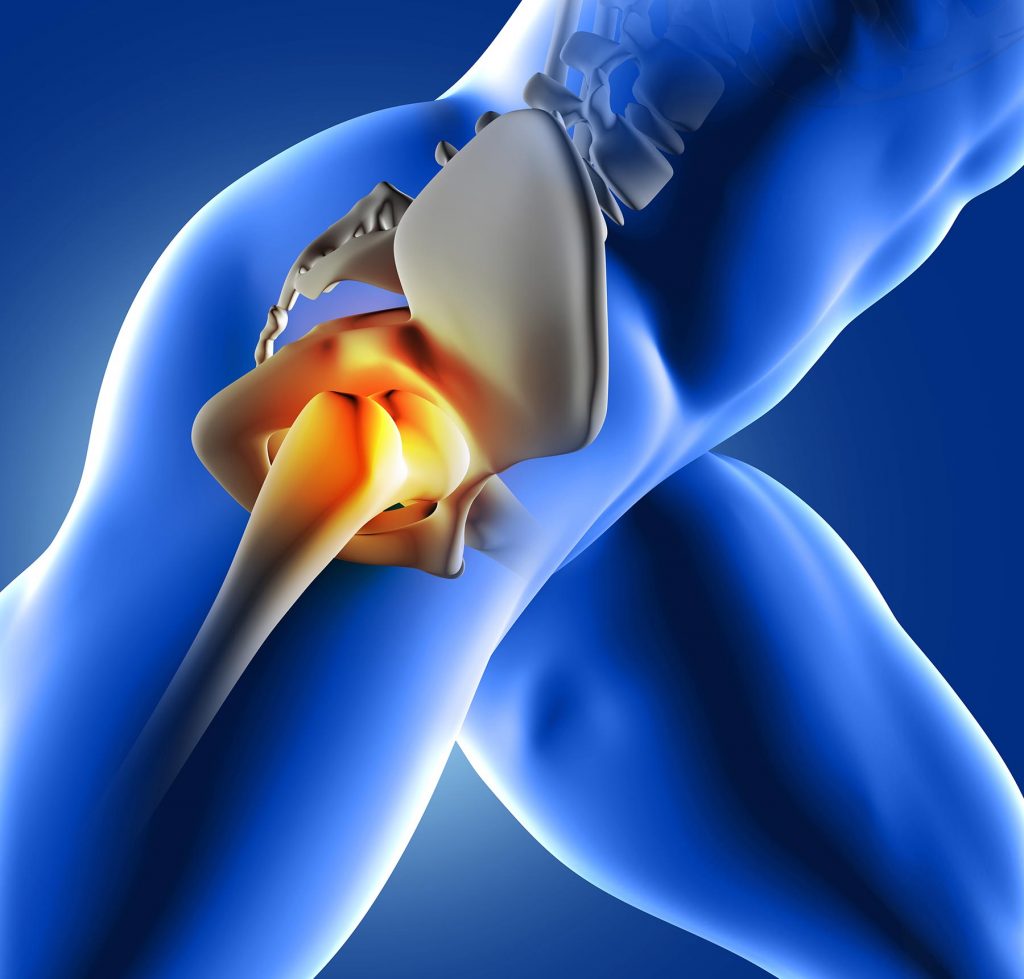- What is Hip Tendonitis?
- What Causes Hip Tendonitis?
- Hip Tendonitis Symptoms
- Diagnosing Hip Tendonitis
- Hip Tendonitis Treatment
- Recovering from Hip Tendonitis

There are approximately 4,000 tendons in the body, and they play a critical role in your ability to move, walk, run, sit and stand. You can develop tendonitis in any tendon, but hip tendonitis is common in people who do repetitive movements or develop weak tendons due to aging. A doctor can perform tests to determine if the tenderness and pain you feel in your hip is hip tendonitis as opposed to hip arthritis or some other medical condition.
What is Hip Tendonitis?
Tendonitis is the inflammation of a tendon due to overuse or injury. It is an inflammatory response to a tendon injury. The hip flexors are a group of muscles in the hip. The psoas major and the iliacus work together to stabilize the hip and enable flexing. The hip muscles begin in the pelvis and the lower spine vertebrae and are attached to the thigh bone with a tendon. Tendons are the connective tissue that attaches your muscles to bones and enables joint movement. This structure enables stable walking, running, sitting and standing.
When the hip tendon is injured and not allowed to heal, you can develop an inflamed tendon in the hip. The area of the tendon becomes tender and painful.
What Causes Hip Tendonitis?
Hip tendonitis is mostly an overuse injury because the tendon is stressed due to repetitive use and muscle contractions. Weak tendons due to aging are also subject to hip tendonitis. The muscle and tendon fibers experience micro-tears that lead to tenderness, pain and other symptoms. The typical causes of hip tendonitis include the following.

- Overworking the tendons and muscles
- Repetitive motions like running, jumping, etc.
- Exercising without proper training
- Suddenly increasing exercise or sports training intensity
Hip Tendonitis Symptoms
Sometimes, people think they have hip arthritis when they have hip tendonitis. Hip arthritis is a deeper pain usually occurring in the front of the hip. Also, hip arthritis can lead to a loss of motion, whereas you experience mostly tenderness with hip tendonitis but not loss of movement.
- Tenderness on the hip
Hip tendonitis usually hurts on the outermost part of the hip where there is a bone and where the tendon starts. This is just below the hip bone. The other common place where it hurts is the front hip muscles (hip flexors). You can also feel tenderness inside your hip bones where the leg folds when you press the area. The main difference between checking for hip tendonitis versus hip arthritis is that you can press the hip area and feel painful tenderness when you have hip tendonitis, and you cannot press the joint to feel hip arthritis pain.
- Hip stiffness
The hip will feel stiff in the morning or after periods of not moving.
- Pain intensifies
The hip tendon pain will intensify throughout the day as you do chores or work.
- Decreased range of motion
When you contract the hip muscles, you feel discomfort and experience a decreased range of motion.
- Swelling
There may be swelling due to inflammation of the tendon.
- Clicking sounds
There may be clicking sounds in the hip.
Diagnosing Hip Tendonitis
A doctor will diagnose hip tendonitis by assessing the hip’s function. This includes doing a physical exam that evaluates the hip joints:
- Range of motion
- Stability
- Flexibility
The doctor will press the area below the hip or in the front of the hip to assess whether there is tenderness. An MRI or x-ray may be ordered to ensure there is no hip bone injury, hip joint arthritis or severe tendon injury.
Hip Tendonitis Treatment
Since hip tendonitis is tendon inflammation, the goal of the treatment is to reduce the inflammation and, thus, the pain. Sometimes, the inflammation can be treated with ice pack applications, over-the-counter nonsteroidal anti-inflammatory drugs (NSAIDs) and rest.
If the hip tendonitis does not respond to home treatments or the inflammation is severe, the doctor will develop a more aggressive treatment plan. It may include:
- Prescription medications that include a corticosteroid, prescription pain medication or platelet-rich plasma
- Physical therapy
- Surgery
Surgery is a last resort and only needed if the tendon needs surgical repair.
The doctor will recommend hip tendonitis exercises that are tendon stretching exercises to relieve pain. Remember that hip tendonitis is usually due to repetitive movements, so changing the movements will stretch the tendon and muscle in new ways. Some of the exercises include the following:
- Hip flexor floor stretch
- Standing quad stretch
- Standing hip flexor swing stretch
- Side-lying rotation
- Side-lying leg lifts
These are just a few examples of effective exercises. Your doctor can suggest the best exercises for your condition.
Recovering from Hip Tendonitis
The risk of developing hip tendonitis increases with age. The reason is that tendons lose some flexibility and strength as people age. If treated early, healing can take a month or six weeks. A lot depends on the severity of the hip tendonitis. It is important to let the tendon heal properly to avoid repeated injury and inflammation, which will weaken the tendon. If you have hip pain, you must see a doctor for assessment and a recommended treatment plan.
Sources
- https://newsinhealth.nih.gov/2014/06/protect-your-tendons
- https://www.ncbi.nlm.nih.gov/books/NBK448174/
- https://medlineplus.gov/ency/imagepages/19089.htm
